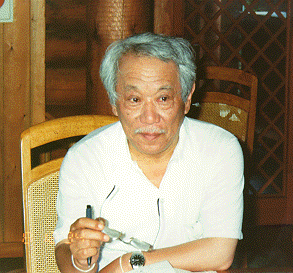Dr. Terushi Tomita

At the post-seminar workshop, '94
- Professor, Dept. of Social Welfare, Nihon Fukushi University, Japan.
Ph.D.(Social Psychology) Columbia University.
International Congress of Applied Psychology;
American Association of Gerontology;
Japan Futures Association;
World Futures Studies Federation.
- Books: Introduction to Bio-feedback (in Japanese), Igaku Shoin, 1983 ;
The Secret of Hell's Kitchen, by Brother Eric (translations),
3 volumes, Jhoshi Paul Publishing, Japan, 1982, 1985.
Papers: Issues and Problems of Social Development in Southeast Asia,
Nihon Fukushi Shoron, vol. 1, 1989.
- Dr. Tomita, after completing his degree, worked at the International
Social Services (headquarters in Geneva), Massachusetts Society for
Cruelty to the Children (1960), and Society for Seamen's Children
as assistant director, meanwhile he did consulting works of
psychoanalysis therapies with East New Yort Mental Health Clinic,
etc. Since 1969 he had taught at Fordham University (New York),
Hunter College (New York), East Tennessee State University, State
University of New York at Stony Brook, while helped promote civil
rights and social conditions of minorities. In 1980 he taught
behavioral psychology, groups therapy and human relations at
Notre-Dame Seishi Women's University, Okayama, Japan, as a visiting
professor. In 1983 he joined the United Nations High Commissioner
for Refugees in Zambia, helping refugees from Angola, Namibia, Zaire.
Since 1988 he holds the current position, while served as director,
Institute of Social Sciences, Nihon Fukushi University
(1991- March,'93).
He is also a lecturer of Social Development at the United Nations
Center for Regional Development (UNCRD), Nagoya, Japan, since 1988,
and works for the regional development of Southeast Asian countries
-- Thailand, Vietnam, Laos, and Cambodia.
- As we approach the 21st century, problems and issues of social
development of a given community are intimately related to the much
broader social context. A community can not survive in isolation and
issues of livelihood of people in a given area are interwoven in a
regional and global community. Hence comes the importance of this
seminar as a visionary mission.
He loves cooking French, Italian and Southeast Asian food. He used to
be a private pilot in Central America.


